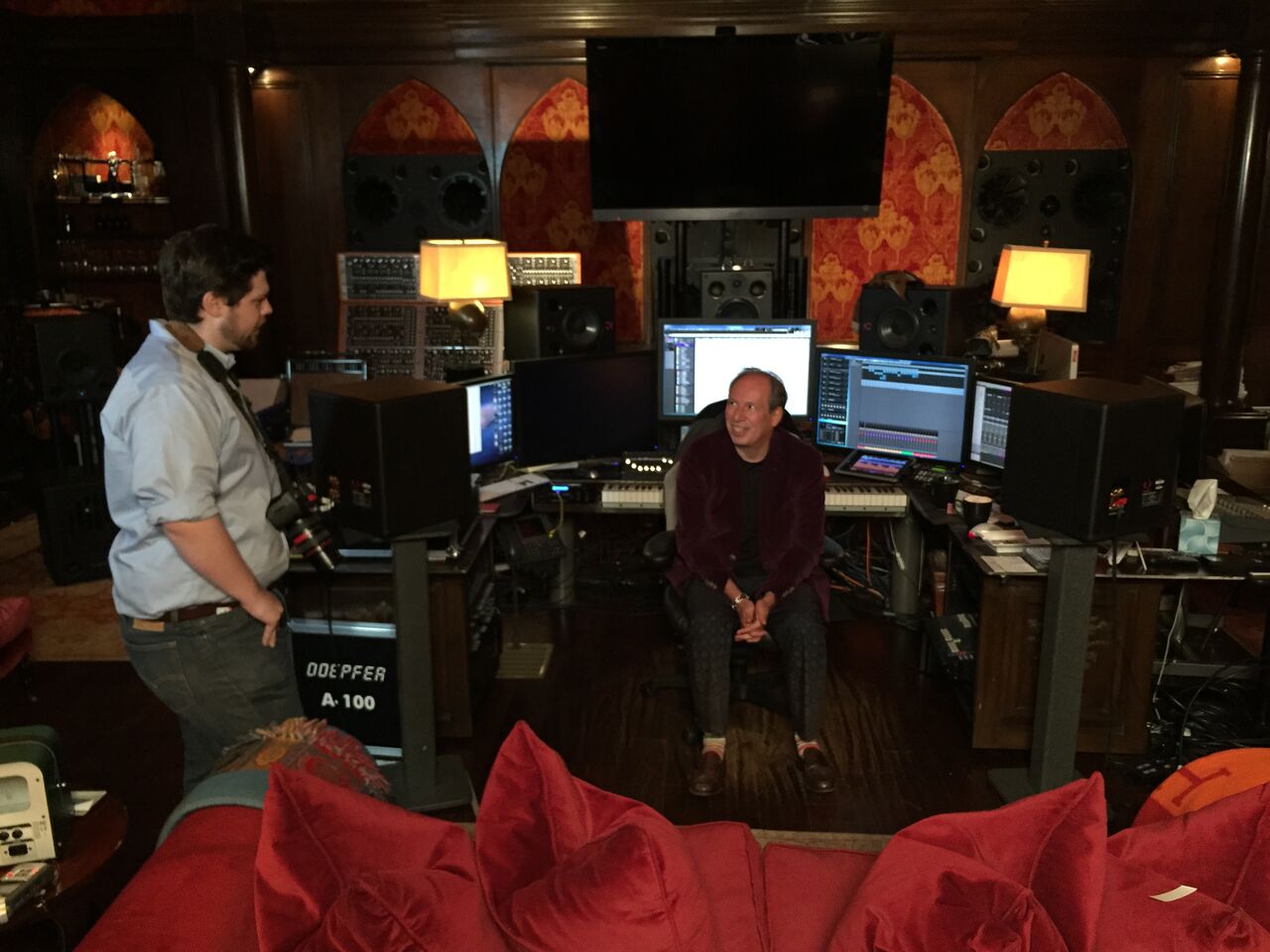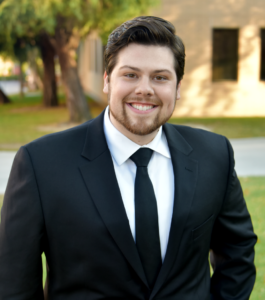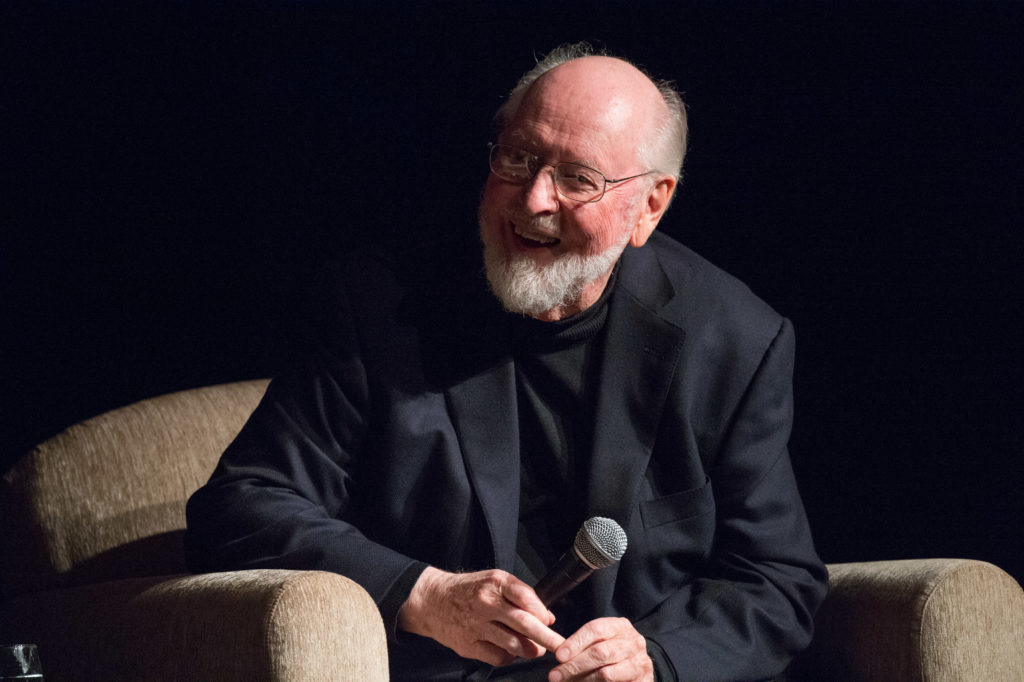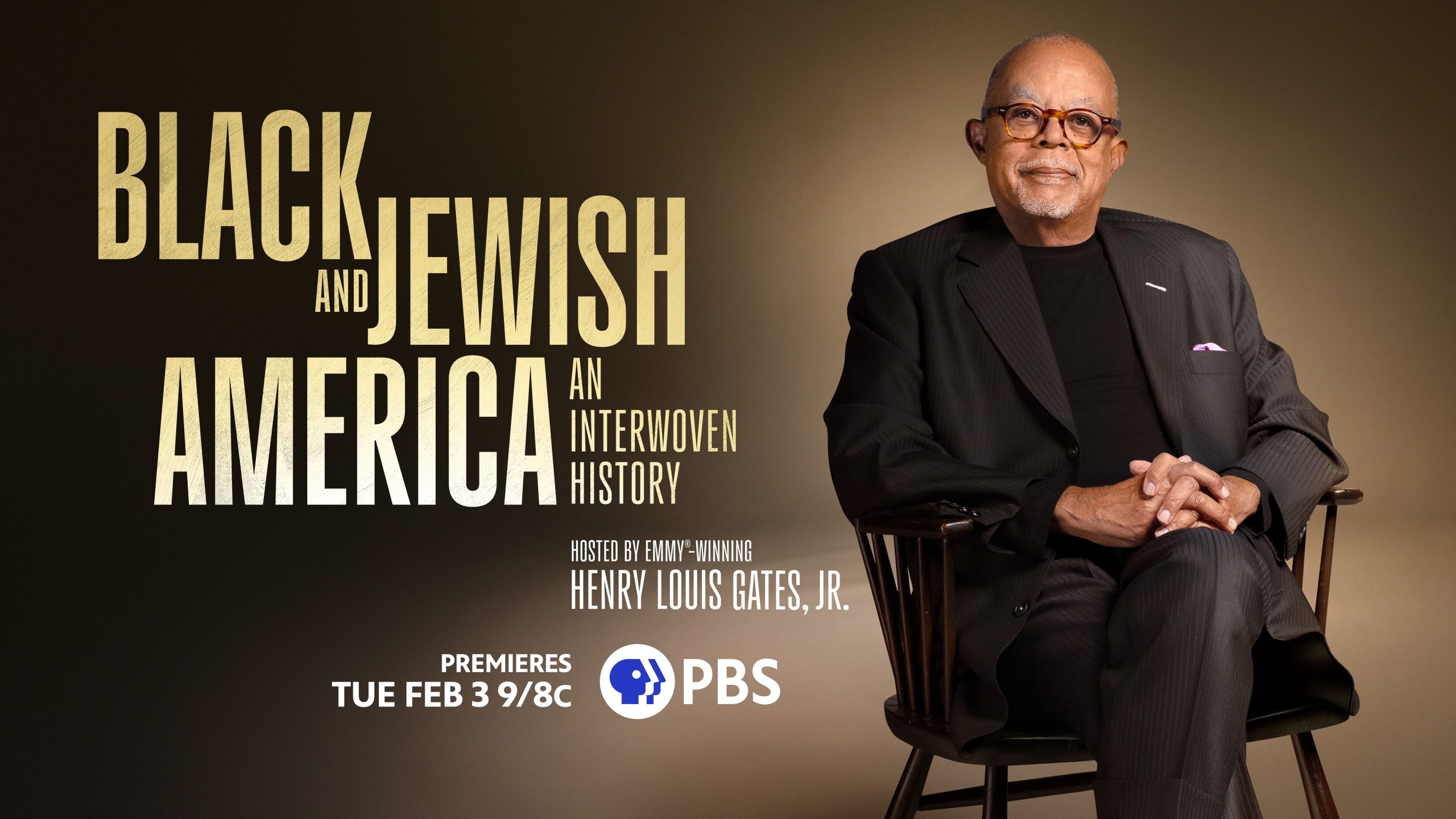
Director Matt Schrader spoke to Solzy at the Movies on Labor Day ahead of Tuesday’s Blu-ray and DVD release of Score: A Film Music Documentary.
Thank you for joining Solzy at the Movies today. How are things treating you?
Matt Schrader: Doing pretty well. Thank you for taking time on your holiday Monday here. It’s very last minute but I’m glad the timing worked.

I’m glad the timing worked too. I took a quick break from transcribing a 22-minute call from last night.
Matt Schrader: Those are fun. I feel your pain.
If I had someone on staff to do all this transcribing, I’d let them do it but…
Matt Schrader: Seriously. The transcribing thing is the worst for these. We did that with all the interviews that we did, too. That was like worst part was that we’d get back excited that we just interviewed Hans Zimmer or whoever and go, “Oh, crap, we have to go log this.” It was like an hour and a half of him sharing things—which is interesting, don’t get me wrong, but such a long process.
When I saw Score: A Film Music Documentary back in May during the Chicago Critics Film Festival, I was blown away.
Matt Schrader: Oh, thank you! It was a lot of fun to make so it’s been a very pleasant surprise to see other people getting jazzed about music and film. We weren’t really sure how it would be received. We’re newbies to this kind of industry. Being from the news world, this is the first feature I’ve ever made so it’s been a lot of fun. We have a lot of people really excited about and that’s just a really, really cool experience for us.
Months later, it’s still on my short list for best documentary of the year.
Matt Schrader: Thank you! We are now Academy Award-eligible. We’re entered there and as you know, there are usually a lot of films that are that. And another one that we’re eligible for is the Grammys have a music film category. We screened it at the Grammy Museum a few months ago and they were like, “You guys are going to submit this for music film, right?” We’re like, I guess, yeah. We weren’t aware that was a thing but they were like “You guys would be really strong contenders.” Who knows maybe we might even get a Grammy nomination or win out of this.
That would be cool. I didn’t even know they had that category.
Matt Schrader: I know? It’s quiet—don’t tell anyone…
But then I mostly pay attention to TV and film.
Matt Schrader: Right, yeah. I was completely unaware that they had it. I’m sure it’s not a huge secret but it is lesser known for sure.
Can you talk about what the audience reception has been like for the film?
Matt Schrader: It’s been a rush to see. Now we’re at a point where we’ve screened at festivals all over the world and we have people that don’t even speak English, which is the language the film is in—of course—who are writing reviews about how much fun they thought the movie was. It’s such a cool—it’s a weird position that I never thought that I would be in but it’s really kind of amazing. We never thought about the people who speak other languages and how this would work for them but we knew the music was an important thing for anyone that watches movies. Most of them seem to come out of Hollywood even if they end up being dubbed into another language or whatever. It’s been really cool to see people from other cultures message us and sometimes phrasing that doesn’t make total sense but the gist of it has been they really enjoyed it. That’s been a fulfilling thing for us.

In many ways, John Williams was a big part of my childhood and even if it was through archival interviews, this film wouldn’t be complete without him. Would you have loved to have gotten an in-person interview?
Matt Schrader: Of course. I think we pushed really hard for that. We ran into a few things and it ended up making it a little bit more difficult—including that he’s getting up there in age. Even his sound bites aren’t what they used to be so was something that we wanted to be kind of mindful of. There would be the temptation that half the movie would be about John Williams if we had interviewed him. In a way, I’m kind of glad that it didn’t work out that way because I think it moves along at a much better click as a result. But, yeah, of course, there’s a few people that we really—Michael Giacchino is another one that we would have loved to interview but the timing and availability didn’t work out.
Did you have a favorite composer growing up?
Matt Schrader: Yeah, I think probably Hans Zimmer because it’s a different style of composing for film than John Williams at least and now it’s been imitated a lot. A lot of people are trying to capture the same magic that he has but yeah, Gladiator’s a good example of a film that is so much more powerful because of the music. The music itself was a statement. It’s a really cool one-two punch when you get a great story with great music. It makes a film last forever as you know. It becomes something that you live in an audience’s head decades before they see the film again. I don’t feel that there’s any other art form that can do it to that level where you can hear it one time over an hour and a half or two hours and it’s with you forever—at least part of it is with you forever. That’s a really cool thing. I think it speaks to how powerful the art form is of cinema.
I’ll still find myself humming John Williams’s themes and I haven’t watched his movies in a while.
Matt Schrader: I know. It’s probably been a decade and a half since I’ve seen the classic Spielberg and John Williams films in total. But you’re right. They stick with you.
In making Score and interviewing all these amazing people, what was something that surprised you the most?
Matt Schrader: Well, there are a couple of things. One of them is reflected in the movie and that’s the studio musicians. There’s a really interesting story they have and we touched on it briefly. The life of a studio musician—especially in Los Angeles and also in London but mostly Los Angeles—is going to Warner Brothers, Fox, or one of these stages, and being handed sheet music and being told the microphones turn on in two minutes, look it over, and we’ll play. The amount of talent that you have to have to play something where there are literally hundreds of thousands of dollars on the line. Every mistake—you got to redo something, it’s going to set 150 people back if you make a mistake. It was amazing to us that those musicians in studio orchestras don’t seem to make mistakes. Of course, it happens but it’s very, very rare. That level of talent is in another world. The people that can play something for the first time and get it perfectly especially when a lot of time in film scores, there are things that are really challenging that have to be explained by the composer or the conductor. It can be really elaborate. In order to never make a mistake, you have to be so much better than what is being asked of you. These musicians are that. We thought that was really cool.
The other thing was how composers will think about the world—kind of their everyday lives—in terms of sound. There are a number of composers that we’re talking about. One, we almost included in the film about getting strange items from E-Bay or ordering them online and breaking them or using them in weird ways. Marco Beltrami—he ordered a wild pig skull. He used the jaw—the teeth basically of the skull—for percussion in a score. Things like that—the average person will never say, “You know what this needs? A pig skull jaw,” but these composers, it may be a crazy idea but they want to see that through. Sometimes, you have a crazy idea that works and everyone realizes after the fact that was an interesting way to approach it and that was a cool thing for us, too.
You quit your job with CBS to make Score through a crowdfunded effort that saw $120,930 donated with a $40,000 goal. At any time did you ever have any doubts that the film might not work out?
Matt Schrader: We were pretty confident that we would reach our goal. I was really surprised at how much international support we had. We didn’t anticipate it at all. We thought it would mostly be US but that’s not the case. I think we had fewer people in the US then in Europe. It makes sense in hindsight but we didn’t anticipate that. We actually had to make a lot of adjustments—to ship something to even the UK, that’s tacking on an extra $13-14 bucks to every single order. It ended up complicating things to that point. But once we kind of figured all that stuff out, it was a thrill. We didn’t really realize how much of a market there was to this. To put it simply as possible, I think it’s been—we were kind of in the right place at the right time. I don’t know that it’s necessarily because we are doing anything that much better than everyone else or that the film is the greatest thing in the world. We’re glad that people have a good time but we didn’t even realize that we would have so many people that are really passionate about it. It’s been a really weird process as we’ve accumulated more people—like I think our Facebook page has over 13,000 fans right now from all around the world. That’s cool. Every time we post something, we get people from every country in the world to chime in on what their thoughts are something and the scores that were important to them. It’s just cool. We kind of tapped into that culture that everyone kind of knew they enjoyed but didn’t realize there was kind of a community, too.
You have three Emmys for your work as an investigative reporter. How does an investigative reporter end up doing a documentary on film music?
Matt Schrader: Well, I think I really wanted to try to make a documentary on this. I had thought about it for years and years and it didn’t make financial sense—especially because I have $100,000 in student debt from college. That’s pretty daunting. You run into that thing where it’s not the smart thing to do but you realize maybe it will be a lot of fun and there could be some opportunity there, too. At one point, I said screw it, let’s try it. Let’s see if these composers will interview with us. I’m going to give it a few months and if it doesn’t work out, I can always go back to the news industry and hopefully, it’ll work.
I used up all of my savings before the Kickstarter campaign. I spent about $11 grand of my own money on camera equipment and lights—all necessary things so we could get going. Sure enough, we got some momentum and that kind of carried us through the rest of the process. I think there was a big leap involved right at the start and the understanding that this could completely flop—the idea that maybe no one in the world is going to want to actually sit down and watch this–or is going to find it valuable. But it was really refreshing and cool to discover that there are a lot of people that are vocal about this and want to see the movie. I still think the coolest thing ever is that we interviewed James Cameron, and James Cameron said “Oh, I can’t wait to see your movie.” I was like “Okay, We’ll do a screening with you or whatever you want to do.” Because how cool would it be to watch a movie with James Cameron? That hasn’t worked out just yet so we’ll see if that happens or not.
Tuesday sees the release of Score on Blu-ray and DVD. What sorts of bonus features are going to be featured on there?
Matt Schrader: I should have an answer to that. I know there are several clips of scenes and interviews of different things that we shot. There’s a director’s commentary on everything. I’ll have to look it up. We have produced two different versions of it, which is why I’m a little confused. The distributor is putting out one version and we’ve basically created for our backers, a different version—and then we have another kind of disc of bonus interviews that we’re distributing to some of our more vocal backers as well. There’s a lot of bonus features here. I’m not exactly sure how they’re all packaged. A lot of them, I know, we reserved to put out on social media. I don’t know that there’s really money to be made that much. I think the people that are following our page will really enjoy it so there’s a perfect market for it. We’ll be putting a lot of it out on our Facebook page, too.
Given that this is was your first feature-length documentary, was there ever a time when it felt like the process was overwhelming?
Matt Schrader: Yeah, pretty much all throughout. Here’s the thing: I was pretty confident that we could figure out what to do. I’ve been shocked. I had no idea how most of these things work. I point to probably two dozen examples of things where I’m on the phone and someone says, how do you plan to do this and I say, Oh, shit. I don’t know. I don’t know how we’re going to do that. We’ve got to figure that out. From everything—from clips that we use in the film to interviews that we do with people. We ran into several people’s agents that were like, “Okay, we usually ask for a $2,000 honorarium for this.” I was like, “Honorarium?” I’m going to look that up. What’s honorarium—basically money that you pay to that person. It’s supposed to cover makeup, hair, and all that stuff. It’s basically a fee. You’re basically paying someone to participate. There were things like that where we ended up coming back and say that this is a journalistic thing—if it doesn’t work out, then we understand but we’re not in a position to be able offer that so we would love it if they could participate but understand if they can’t. Everyone was a good sport about that so it ended up working out. All of those things.
The whole distributor business—that’s brand new to us. We had no idea how that would work. The film festival thing—I’d have never been to a film festival in my life. Each kind of step of making this film, showing the film, exhibiting the film, where we’d go after we’d win at a film festival or something. What can we turn that into or is that something that just goes on the poster? So we’ve really had to—it’s been interesting and the investigative journalist in me likes it because I get to undercover a lot of the things about the process as we’re making this so it kind of feels like I’m still making the movie even though it’s already been out for a long time. But all these other elements that kind of have to be figured out. There are some people we can turn to and make some calls to.
Really, I think—I’ll tell you the truth—in a month from now, I have no clue what we’ll be doing. I have no clue. I know we’ll keep showing the film. We’ll do a lot of screenings. I’m not entirely sure what kind of awards push that we’ll have—no clue. Screenings will be scheduled for that kind of stuff. That’s part of the fun of it. We kind of got to figure it out as we go along. We’re new to this so if we don’t maximize the potential that was there, it will be a little disappointing. But that’s kind of the challenge is to try and make sure that we make the most of every single step in the process here even if we don’t really know much about how it all works.
What other projects are you working on?
Matt Schrader: Well, we’re working on another feature right now that we just started working on in the last month or so. I don’t know if this is a super-interesting answer for you because both this and a series that we’re working on are things that we can’t really go into detail about yet, contractually, but they are about the audio world, not necessarily the musical world, but they are kind of fun in that way. We’ll see. In just a few months, I may be able to share some of that. I’ll have to look into what the company’s instructions to me are and what the contract allows me. I think that personally and speaking kind of selfishly about it, Score may become a bit of a calling card and allow me to leave the news world entirely and make documentaries so it’s certainly trending in that way. I’m kind of excited to see that through.
Thanks again for your time.
Matt Schrader: Yeah, you bet.





